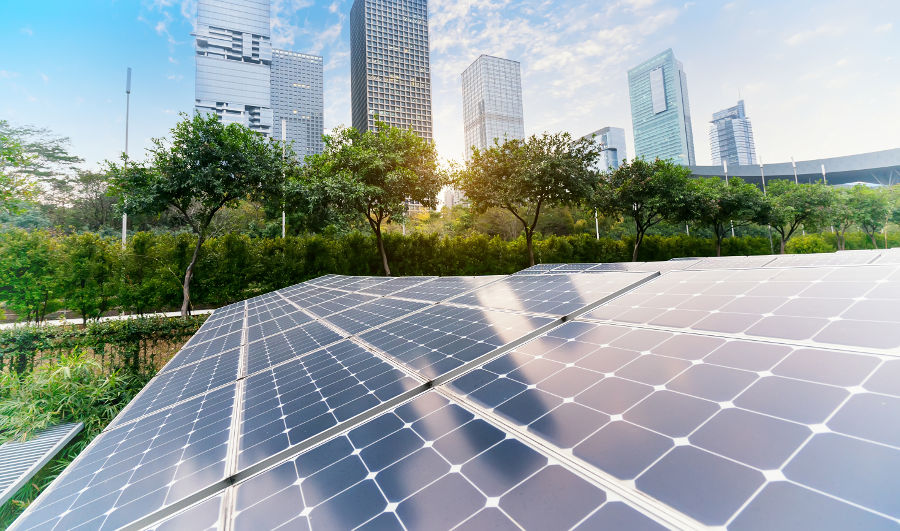On April 18th, the City Council passed the Climate Mobilization Act, a package of seven related bills targeting climate change. A few days later (on Earth Day), the Mayor announced a related proposal, touted as a NYC Green New Deal.
We’ve gathered what you need to know about the most critical pieces of regulations for NYC owners and managers, especially how (and when) they’ll impact your properties.
Click on a particular piece of legislation to learn more about that specific rule, including estimated effective dates and a link to the exact copy of the law:
Green Roofs
Previously, 1032-A was passed by the council, requiring a sustainable roofing zone for work involving the “replacing of an entire existing roof deck or roof assembly.” Basically, new construction projects and buildings undergoing “certain major renovations” will have to include a sustainable roofing zone.
With the new law, HPD will now study the potential impact of complying with this rule for different types of buildings, especially smaller properties or buildings involved in specific housing programs. Certain buildings may be able to hold off on compliance for 5 years after the effective date.
Based on the initial pass date, this law will likely go into effect in the Fall (likely October), so stay tuned for enforcement rules. The city also passed a separate but related resolution calling on the State legislature to increase the real property tax abatement for green roof installation to $15/square foot. We’ll let you know if this makes its way through the state.
Based on the above rule, the Office of Alternative Energy will be required to maintain a website featuring contact information, links to details regarding green roof system installation, and other resources and materials for sustainable roofing. This effective date is 120 days from signing (as opposed to the green roof requirement itself), so the website should be active in late Summer, before the green roof requirement will be enforced.
Energy Grades and Loans
You may recall that Local Law 33 of 2018 will require owners of covered buildings to submit annual energy scores starting in 2020. The Benchmarking tool will be used to calculate energy efficiency scores, and the city-issued grade will be in accordance with a set range.
As of April 18, 2019, grade ranges for all building energy efficiency scores have been adjusted, with high and low grades getting an increased range size.
For example, a score of 85 or higher will now land a building an A grade – previously the required score for an A was 90. On the other end of the spectrum, anything lower than 55 will result in a D grade. The previous cutoff score was 20.
The rules for F (noncompliance) and N grades (not feasible to obtain a score, or given an exemption) remain the same.
This rule is in place now, so energy scores submitted during the first required round in 2020 will be graded using these new ranges.
This bill establishes PACE: Property Assessed Clean Energy Program. The city will use funds (and possibly get help administering said funds from a for-profit or non-profit organization) to establish PACE, designed to distribute and manage long-term financing for energy efficiency improvements. NYC owners will be eligible for loans to finance installations for renewable energy systems and energy efficiency improvements for their buildings located within the city limits.
Details about the loan program (eligibility, application processes, etc.) are forthcoming – we’ll post them here as soon as they’re released.
Emission Regulation
This is a big one. The Council is establishing an office at the DOB to deal specifically with energy and emissions. According to the new law, the office will have several responsibilities, including:
- Overseeing implementation of building energy and emissions performance laws and policies for existing buildings, new construction, and major renovations
- Establishing or administering protocols for assessing annual energy use in buildings
- Monitoring buildings’ energy use and emissions, and reviewing building emissions assessment methodologies
- Creating an online portal for the submission of annual emission assessments from building owners
- Auditing said submissions, as necessary
- Determining recommended penalties for noncompliant buildings (buildings that emit higher greenhouse gases than mandated, or buildings that fail to submit reports)
- Overseeing cross-departmental (DEP, HPD) participation and cooperation
This is the office that would be overseeing annual emission assessments submitted by building owners, including enforcement for failure to submit assessments or for exceeding set emission levels.
The law goes into detail on timelines for establishing rules, exactly which buildings will be required to comply with policies handled by this office (specifically, covered buildings that match LL 84 requirements, with some exceptions), and required future filings this office will oversee.
There are several individual deadlines in the law, starting in 2023 and continuing through the 2050 plan. That said, the office itself and director in charge don’t exist yet. The DOB will likely release more information on this office, along with some details on individual reporting and submission requirements, later this year.
Mayor de Blasio’s Green New Deal for NYC still needs legislation to specify details – especially for the mandate to cut emissions at buildings across the city by implementing retrofits. These rules are likely to be presented and passed over the next few years, so there’s no immediately required actions outside of already-passed legislation. In fact, the OneNYC-2050 Action plan outlines emission cuts legislation for covered buildings by calendar-end 2020, and small & affordable buildings by calendar-end 2021. That said, it’s not a bad idea to take stock of current emissions per building, current plans for sustainability, and areas for improvement across your portfolio – enforcement may be years away, but it’ll be here before you know it.
Related Articles
About the Author
Kristen Hariton
Kristen Hariton is the Vice President, Product Engagement at SiteCompli, focused on exploring new solutions and innovations in property operations tech. When she's not sharing the latest industry trends, changes, and updates, she's planning her next adventure to Walt Disney World.



